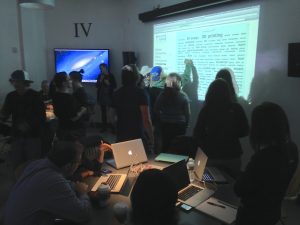2017 Digital Humanities Week: STEM to STEAM
Digital Humanities Week
University of Maine at Orono
2-6 October 2017
http://DigitalHumanitiesWeek.org
What relevance do the arts and humanities have in a world whose swift transformation seems increasingly driven by science and technology? That’s the theme of this year’s Digital Humanities Week, a conference at the University of Maine during the first week of October, 2-6, whose events range from formal presentations by extraordinary speakers to ad hoc hackathons run by students.
A growing movement known as “STEM To STEAM” aims to interject the Arts into the STEM disciplines (Science, Technology, Engineering, and Mathematics). This movement’s premise is not simply that humanistic creators and scholars will benefit from access to digital tools, but that traditional STEM fields need the creativity and perspective of the arts and letters to improve their diversity, retention, and accountability.

For many people, picturing an artist who contributes to science conjures up a Renaissance man from 500 years ago, such as Leonardo da Vinci. It may be hard to imagine lay citizens contributing to science in a time of Big Data and $9 billion particle accelerators.
Yet the inventors of the pacemaker, medical stents, military camouflage, and vehicle airbags were all artists or inspired by artists, while today’s Nobel laureates in the sciences are seventeen times likelier than the average scientist to be a painter and twelve times as likely to be a poet.
At this year’s Digital Humanities Week, speakers from MIT, Harvard, Dartmouth, UCLA, and the University of Texas–as well as other UMaine campuses and Bowdoin and Colby colleges–will demonstrate or examine art-science collaborations that have produced groundbreaking scientific discoveries, from the use of DNA to store cultural data (the Library of Congress fits in a test tube) to audio microscopes (each microbe has its own signature sound).
Other demonstrations include creating “Hypercities” by superimposing layers of historical data on an urban map; using a planetarium dome for data visualization or 3d sound; and building virtual museums to document local economies (“Blueberries, Clams, and Beer”).

Champions of the STEAM approach argue that integrating the arts into science and technology can make those fields more inclusive of diverse people and perspectives. In recent years the technical sector has come under increasing fire for its underrepresentation of women and minorities. Fortunately, the higher percentage of women in fields such as art and design suggests that a more inclusive approach to educating a technically literate future generation might be to incorporate more teaching techniques and issues from the arts. Advocates for the arts and humanities argue they can also provide a moral compass to help society navigate the ethical dilemmas of such momentous scientific breakthroughs as gene editing and artificial intelligence.
College of Liberal Arts and Sciences Dean Emily Haddad said, “With STEM to STEAM as its topic, Digital Humanities Week at UMaine participates in a broad national conversation about liberal arts education and about the crucial importance of connecting ideas across disciplines.”
Founded at the University of Maine in 2011, the biennial Digital Humanities Weeks focus on the ways that new technologies are transforming arts and letters, history, and the social sciences.
Other subthemes of this year’s conference will include women and code, digital storytelling, copyright and fair use, and others related to technology and culture.
Visitors who participate in workshops can earn digital “badges” as part of the University of Maine’s badging initiative. Students can display these emblems on their websites to show off their skills and achievements to prospective employers.
The conference includes two dozen events running Monday through Friday, all free and open to the public. The organizers request that visitors register on the website to ensure sufficient space for all and to target the workshops to participants’ interests. To register or learn more, visit:
http://DigitalHumanitiesWeek.org
Digital Humanities Week is sponsored by a CLAS Events & Experiences grant, the McGillicuddy Humanities Center, McBride Fund, New Writing Series, Center for Innovation in Teaching and Learning, the Digital Curation graduate program, and the departments of History and New Media, a program of the School of Computing and Information Science.
For more information, contact Alan Berry, 581.1955, or Jon Ippolito, 581.4477.

